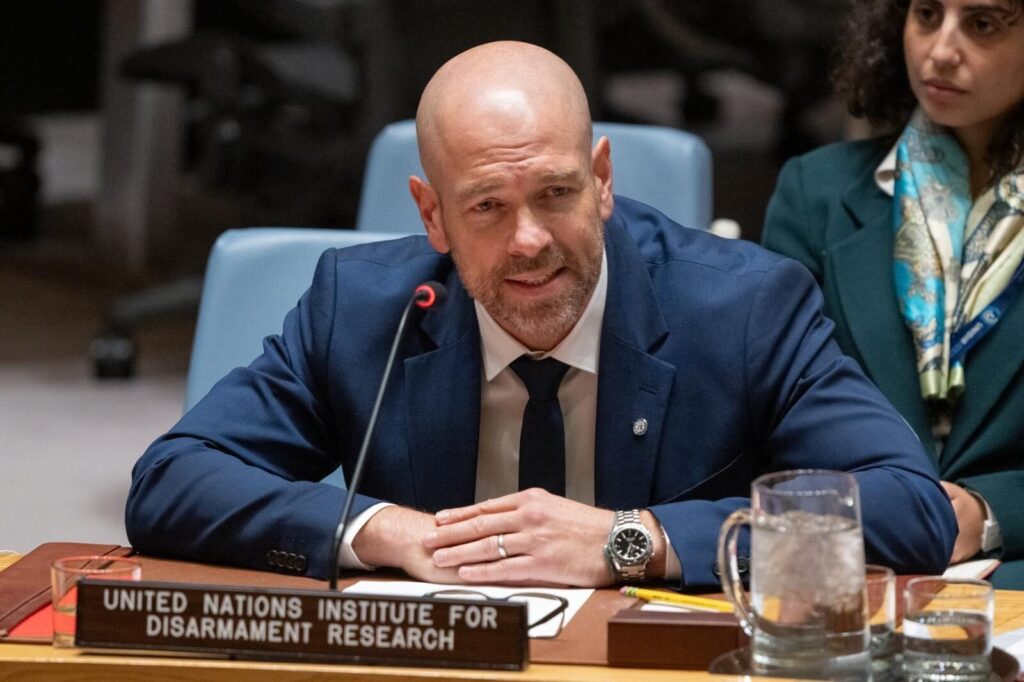On 21 October, Dr Robin Geiss, UNIDIR Director, briefed the United Nations Security Council members on the maintenance of international peace and security. The high-level briefing, chaired by H.E. lgnazio Cassis, Head of the Federal Department of Foreign Affairs of Switzerland, addressed the critical need to anticipate the impact of scientific developments on international peace and security.
In his address, Dr Geiss highlighted the transformative potential of new technologies, such as quantum computing and artificial general intelligence (AGI), and the need for global governance frameworks that can keep pace with these rapid advancements.
He underscored that many technologies now integral to security dynamics—such as cyber tools and advanced robotics—were once considered “emerging.” However, the increasing speed with which technologies are developed, marketed and adopted compresses the time available for policymakers to react.
“It took half a century for the electric grid to reach 100 million homes, but in 2022, ChatGPT achieved this milestone in just two months,” Dr Geiss said – emphasizing the urgency of early action.
One key element of his briefing was the convergence of multiple technologies and their “dual-use nature,” which can lead to unintended consequences in warfare, humanitarian crises, and broader peace efforts. He called for a systematic and future-oriented approach to anticipate the compounding impacts of these technologies, particularly in areas like AI, biotechnology and space exploration.
A global call for knowledge-based policy
As part of the global effort to address these challenges, Dr Geiss highlighted the importance of the Pact for the Future, which stresses the use of evidence-based knowledge for policymaking. “This is particularly relevant in the field of science and technology, where media hype often surpasses solid scientific understanding,” he explained. The Pact calls for concerted action to ensure that technological innovations benefit humanity while mitigating their risks.
In line with these objectives, UNIDIR will be convening its flagship Innovations Dialogue on 22 November 2024, which will be held under the theme “Quantum technologies and their implications for international peace and security”. Co-hosted with the Geneva Science and Diplomacy Anticipator, the event aims to facilitate foresight and provide future-oriented analysis on the latest breakthroughs. Dr Geiss identified quantum technology as a critical topic on the horizon. He warned that in as little as five to ten years, quantum technology could disrupt global security, rendering current encryption techniques obsolete and revolutionizing surveillance and warfare capabilities.
Navigating uncharted risks
Dr Geiss also sounded the alarm on AGI, a next-generation form of artificial intelligence that could operate autonomously across a range of tasks, like human intelligence. While AGI could be a force for good in addressing global challenges, its misuse poses existential risks. He outlined two specific concerns: the potential loss of human control over AGI’s actions and the difficulty of ensuring that AGI’s motivations align with human values.
“Once AGI reaches a level of intelligence beyond human capabilities, humans might lose the ability to govern or constrain its actions,” he said – calling for serious consideration of this risk by policymakers.
A framework for anticipation
The briefing called for institutionalizing “horizon-scanning dialogues” within the Security Council to foster early awareness of emerging technologies. Dr Geiss proposed that the Council consider annual briefings on the impact of scientific developments on peace and security, supported by expert advice from UNIDIR’s Futures Lab initiative. These efforts would help anticipate new protection needs and assess how existing international regulations might apply to rapidly evolving technological landscapes.
“The Security Council can offer a unique perspective of its own on how scientific advances and new technologies impact peace and security. In this way, it can strengthen the ability of the UN system as a whole to better prevent or respond to newly emerging threats, bolstering in turn the prospect of sustained peace and security in the future,” he concluded.
